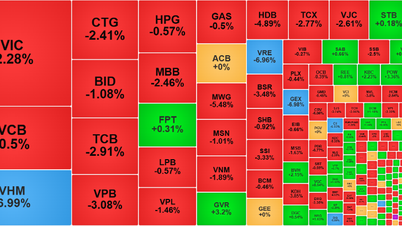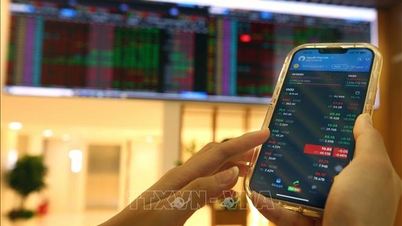
With the 20% tax rate option, the total amount of money that profitable investors must pay to the tax authority will be relatively larger than the current amount - Photo: HA QUAN
There is no “superior” way to calculate the income tax on securities transfers for all. With the current tax collection method – a tax rate of 0.1% multiplied by the total value of securities sold – investors who make a profit will benefit more and vice versa...
Differences between current tax and new proposal
Under current personal income tax law, income from securities transfer is subject to a tax rate of 0.1% on the total value of the sale transaction, regardless of profit or loss.
For example, if an investor sells ABC shares and makes a profit of 10%, the total selling value is 2 billion VND, then the personal income tax payable is about 2 million VND. Conversely, if the investor transfers this share but loses 10%, meaning the total selling value is only 1.8 billion VND, then the personal income tax payable is 1.8 million VND.
Meanwhile, according to the draft Law on Personal Income Tax (replacement) that is being consulted, the Ministry of Finance proposes that resident individuals transferring securities will be subject to a tax rate of 20% on taxable income.
This taxable income is determined by the selling price minus the purchase price and related reasonable expenses in the annual tax period. In case the purchase price and related expenses cannot be determined, the tax amount will be equal to 0.1% multiplied by the selling price of the securities, calculated for each transaction.
Thus, it can be understood that personal income tax will only be collected when there is a profit, in accordance with the logic that personal income tax is a tax on "income"; if there is a loss, no tax liability will arise.
The 20% tax rate will be "levied" on the net profit. For example, if an investor sells XYZ stock with a 10% profit, capital of 10 billion VND, profit of 1 billion VND, the tax payable will be about 200 million VND. Conversely, if XYZ stock is sold with a 10% loss, no tax will be payable.
A financial and securities expert said that although option 2 "seems more reasonable" in principle (taxing only when there is income), through the above example, it can be seen that the amount of tax payable at a tax rate of 20% on net profit is much higher than the current rate of 0.1%.
Not to mention, the calculation of tax based on interest will be more complicated, requiring detailed settlement of cost price and expenses, instead of direct deduction as at present.
How do other countries collect taxes?
To increase the persuasiveness of the proposed new tax collection method, the Ministry of Finance cited Japan as an example. In this country, income from the sale of certain securities (including stocks, equity in companies, warrant bonds, etc.) is taxed separately from other sources of income at a fixed rate of 20.315%.
In China, a 20% tax rate applies to income from the transfer of unlisted securities, determined by revenue minus related expenses.
According to the author's research, in the US, stock transfer tax is capital income tax, calculated only on net profits, but the tax rate depends on the holding period and the individual's income.
In particular, the US allows capital loss deductions. If you sell stocks at a loss, you can use that loss to reduce profits from other transactions or deduct it from taxable income (up to $3,000/year; the remaining loss is carried forward to the following year).
The tax rates applied by the US are also calculated based on time, short-term (Short-term capital gains) and long-term (Long-term capital gains).
Short-term applies to securities held for less than 1 year. Accordingly, tax rate = ordinary income tax rate, from 10 - 37% depending on the individual's income level.
Long-term applies to securities held for 1 year or more. Preferential tax rates: 0%, 15%, or 20%, depending on individual income.
Source: https://tuoitre.vn/lai-1-ti-dong-ban-chung-khoan-se-nop-thue-bao-nhieu-theo-de-xuat-moi-20250722101812181.htm


![[Photo] Da Nang: Water gradually recedes, local authorities take advantage of the cleanup](https://vphoto.vietnam.vn/thumb/1200x675/vietnam/resource/IMAGE/2025/10/31/1761897188943_ndo_tr_2-jpg.webp)



![[Photo] Prime Minister Pham Minh Chinh attends the 5th National Press Awards Ceremony on preventing and combating corruption, waste and negativity](https://vphoto.vietnam.vn/thumb/1200x675/vietnam/resource/IMAGE/2025/10/31/1761881588160_dsc-8359-jpg.webp)






































































































Comment (0)